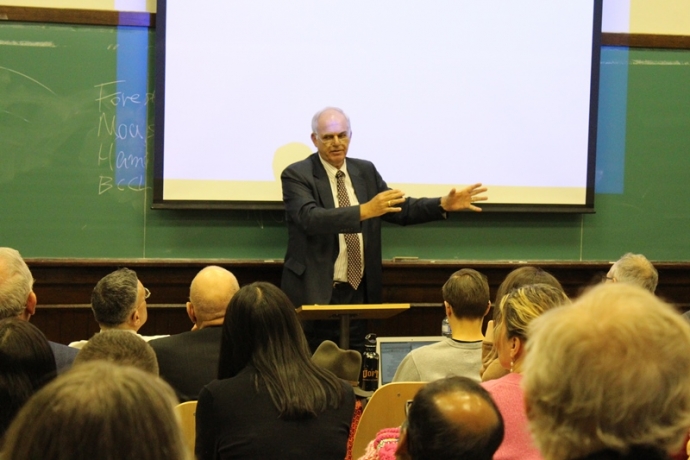Konrad von Finckenstein gave the 2015 Grafstein Lecture in Communications
Story and photo by David Kumagai, 3L
What happens when a legal regime stuck in the antennae era tries to resolve digital disputes? Competition suffers, says Konrad von Finckenstein.
“Eons have passed since major [communications] legislation was passed,” the former Chairman of the Canadian Radio-television and Telecommunications Commission told an audience packed with professors and students on January 27.
The retired Federal Court judge delivered a call to action at the 2015 Grafstein Lecture in Communications at the Faculty of Law. He warned Canada’s antiquated legal regime is strangling competition. There has not been a significant overhaul of communications laws since the early 1990s.
Von Finckenstein outlined several proposals to help bring the country into the 21st century.
He urged lawmakers to enshrine ‘net neutrality’ (the popular principle which ensures all websites are offered to users at the same Internet speed), scrap Canadian ownership requirements, streamline the industry’s oversight bodies and enable more private rights of action within the communications sector.
Von Finckenstein explained “we don’t have new entrants coming [into Canada] because they don’t know what the rules are.” Despite the prosperity of the industry’s major players, he warned “there are serious fissures” in the legal landscape, “and if we don’t do something now they will become bigger.”
He attacked what he described as the nonsensical division of Canada’s regulatory regime, in which four major institutions divvy up oversight of the communications sector (Industry Canada, Department of Canadian Heritage, the CRTC, and the Competition Bureau). “The distinctions don’t make sense from a technological point of view,” von Finckenstein said, “it’s all done digitally now.”
Lack of Focus
Unlike Australia and the United States, Canada has failed to articulate a coherent vision for regulating the not-so-new media environment, von Finckenstein said.
“We have no overarching, comprehensive policy that says where we are going, what is our goal,” he explained.
Von Finckenstein pointed to Australia as an example of a country with a communications policy for the Internet age. The country is rolling out a National Broadband Network plan designed to ensure all Australians have access to high-speed broadband. He also noted that the United States has a “very extensive” wireless policy.
Incremental Approach
Despite von Finckenstein’s belief that a major regulatory overhaul is necessary, he said the “political realities” mean “ there is no chance at all of this happening.”
He blamed the television industry for the standstill, calling it “the elephant in the room,” dead-set on resisting any attempt at overhauling the system. “You cannot do communications reform without dealing with TV,” he said.
The former CRTC chair said the political risks are too great. “It has nothing to do with this government,” he explained. “The existing players have learned to live with the system. There is built-in resistance to change.”
Instead, he laid out a series of piecemeal changes that he said may pave the way for more fundamental changes when the time is right.
“We have no other option. We can’t have a wholesale change and we can’t sit back and do nothing,” he explained.
Suit Up
In terms of the private rights of action, von Finckenstein, dismissed current restrictions on private actions in the telecommunications sector. “I don’t see what is so sanctified about telecommunications,” he said, “and why telecom players cannot sue.”
Von Finckenstein suggested the rights of action could partially replace the role of oversight bodies, such as the CRTC, which are currently tasked with resolving these disputes. He explained that the problem with the existing regime is that only a select few, high-profile cases are heard each year, and the others are ignored.
Canadian Content
Former senator, and founder of the lecture series, Jerry Grafstein objected to von Finckenstein’s call for a weakening of Canadian content and ownership requirements.
Grafstein, who founded several major media companies, such as CityTV, prior to joining the Senate, credited such laws for enabling the growth of independent Canadian television and music. “Bryan Adams wouldn’t exist today if it weren’t for [FM radio regulations],” Grafstein said.
Grafstein recalled that in the 1980s, like today, “people said regulators couldn’t make a difference with Canadian content, but we did.”
“I think there is still a way to make Canadian content a priority,” Grafstein said. “There are 17,000 ways to do it. The BBC does it quite well.”
For his part, von Finckenstein was skeptical. “But is it sustainable?” he asked. “The Internet has made it difficult; 16-year-olds aren’t listening to the radio, they’re listening to Spotify. How do you regulate that?”
The Grafstein Annual Lecture in Communications was established by Senator Jerry S. Grafstein, Q.C., Class of 1958, to commemorate the 40th anniversary of his graduation from the Faculty of Law and the 10th anniversary of the graduation of his son, Laurence Grafstein and daughter-in-law, Rebecca Grafstein (nee Weatherhead), both from the Class of 1988.

